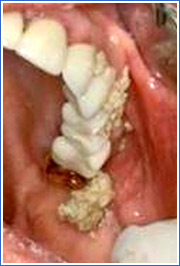Vascular Disease
Periodontal disease is associated with coronary artery disease and cerebrovascular disease.
- Studies support an association between PD and ASVD, but not a causative relationship.
- Inflammatory cytokines implicated in atherogenesis are produced in patients with periodontal disease.
- Treatment of periodontal disease has not been shown to date to reduce cardiovascular risk.
Strokes can result in multiple oral problems, such as:
- Oral sensory and motor deficits
- Poor tongue function and lip seal
- Dysphagia
- Reduced oral clearance of foods and increased food packing
- Reduced dexterity negatively affecting ability to perform oral hygiene
- Increased caries and periodontal disease risk
Food Packing

References
Lockhart PB, et al. Periodontal Disease and Atherosclerotic Disease: Does the Evidence Support an Independent Association? Circulation. 2012. Accessed on 9/20/2021.
Kebschull M, Demmer RT, Papapanou PN, "Gum Bug, Leave my Heart Alone!" Epidemiologic and Mechanistic Evidence Linking Periodontal Infections and Atherosclerosis. J of Dental Research. 2010;89:879-902.
Liljestrand JM, Paju S, Pietiäinen M, et al. Immunologic burden links periodontitis to acute coronary syndrome. Atherosclerosis.2018; 268: 177-184.
Meurman JH. A role for oral health personnel in stroke prevention. Compend Contin Educ Dent. 2017; 38(8 Suppl): 26-28.
Li C, Lv Z, Shi Z, Zhu Y, Wu Y, Li L, Iheozor-Ejiofor Z. Periodontal therapy for the management of cardiovascular disease in patients with
chronic periodontitis. Cochrane Database of Systematic Reviews 2014, Issue 8. Art. No.: CD009197. DOI:
10.1002/14651858.CD009197.pub2.